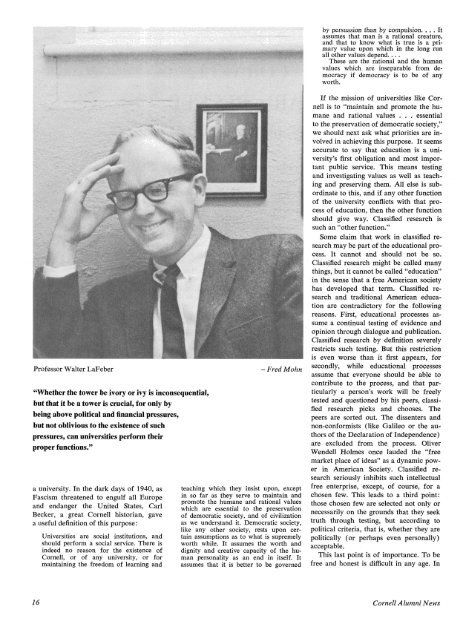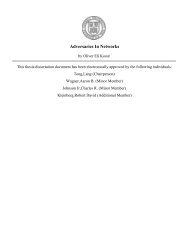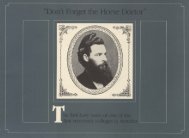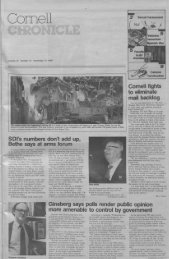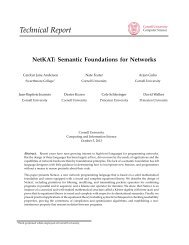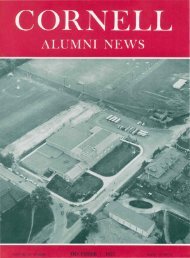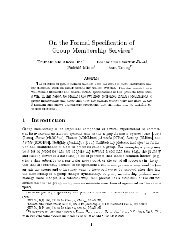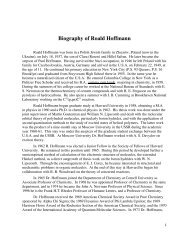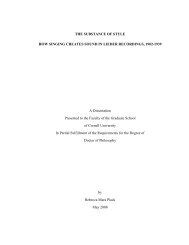Cornell Alumni News - eCommons@Cornell - Cornell University
Cornell Alumni News - eCommons@Cornell - Cornell University
Cornell Alumni News - eCommons@Cornell - Cornell University
Create successful ePaper yourself
Turn your PDF publications into a flip-book with our unique Google optimized e-Paper software.
Professor Walter LaFeber<br />
"Whether the tower be ivory or ivy is inconsequential,<br />
but that it be a tower is crucial, for only by<br />
being above political and financial pressures,<br />
but not oblivious to the existence of such<br />
pressures, can universities perform their<br />
proper functions. 9 '<br />
a university. In the dark days of 1940, as<br />
Fascism threatened to engulf all Europe<br />
and endanger the United States, Carl<br />
Becker, a great <strong>Cornell</strong> historian, gave<br />
a useful definition of this purpose:<br />
Universities are social institutions, and<br />
should perform a social service. There is<br />
indeed no reason for the existence of<br />
<strong>Cornell</strong>, or of any university, or for<br />
maintaining the freedom of learning and<br />
- Fred Mohn<br />
teaching which they insist upon, except<br />
in so far as they serve to maintain and<br />
promote the humane and rational values<br />
which are essential to the preservation<br />
of democratic society, and of civilization<br />
as we understand it. Democratic society,<br />
like any other society, rests upon certain<br />
assumptions as to what is supremely<br />
worth while. It assumes the worth and<br />
dignity and creative capacity of the human<br />
personality as an end in itself. It<br />
assumes that it is better to be governed<br />
by persuasion than by compulsion. ... It<br />
assumes that man is a rational creature,<br />
and that to know what is true is a primary<br />
value upon which in the long run<br />
all other values depend. .. .<br />
These are the rational and the human<br />
values which are inseparable from democracy<br />
if democracy is to be of any<br />
worth.<br />
If the mission of universities like <strong>Cornell</strong><br />
is to "maintain and promote the humane<br />
and rational values . . . essential<br />
to the preservation of democratic society/'<br />
we should next ask what priorities are involved<br />
in achieving this purpose. It seems<br />
accurate to say that education is a university's<br />
first obligation and most important<br />
public service. This means testing<br />
and investigating values as well as teaching<br />
and preserving them. All else is subordinate<br />
to this, and if any other function<br />
of the university conflicts with that process<br />
of education, then the other function<br />
should give way. Classified research is<br />
such an "other function."<br />
Some claim that work in classified research<br />
may be part of the educational process.<br />
It cannot and should not be so.<br />
Classified research might be called many<br />
things, but it cannot be called "education"<br />
in the sense that a free American society<br />
has developed that term. Classified research<br />
and traditional American education<br />
are contradictory for the following<br />
reasons. First, educational processes assume<br />
a continual testing of evidence and<br />
opinion through dialogue and publication.<br />
Classified research by definition severely<br />
restricts such testing. But this restriction<br />
is even worse than it first appears, for<br />
secondly, while educational processes<br />
assume that everyone should be able to<br />
contribute to the process, and that particularly<br />
a person's work will be freely<br />
tested and questioned by his peers, classified<br />
research picks and chooses. The<br />
peers are sorted out. The dissenters and<br />
non-conformists (like Galileo or the authors<br />
of the Declaration of Independence)<br />
are excluded from the process. Oliver<br />
Wendell Holmes once lauded the "free<br />
market place of ideas" as a dynamic power<br />
in American Society. Classified research<br />
seriously inhibits such intellectual<br />
free enterprise, except, of course, for a<br />
chosen few. This leads to a third point:<br />
those chosen few are selected not only or<br />
necessarily on the grounds that they seek<br />
truth through testing, but according to<br />
political criteria, that is, whether they are<br />
politically (or perhaps even personally)<br />
acceptable.<br />
This last point is of importance. To be<br />
free and honest is difficult in any age. In<br />
16 <strong>Cornell</strong> <strong>Alumni</strong> <strong>News</strong>


